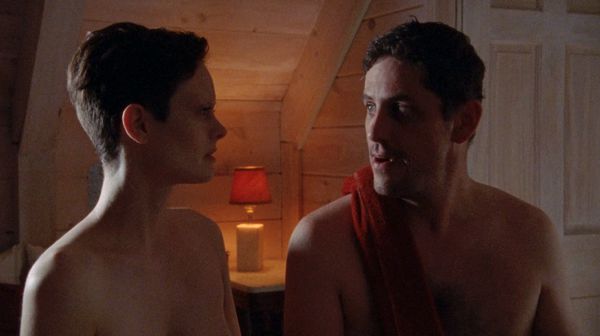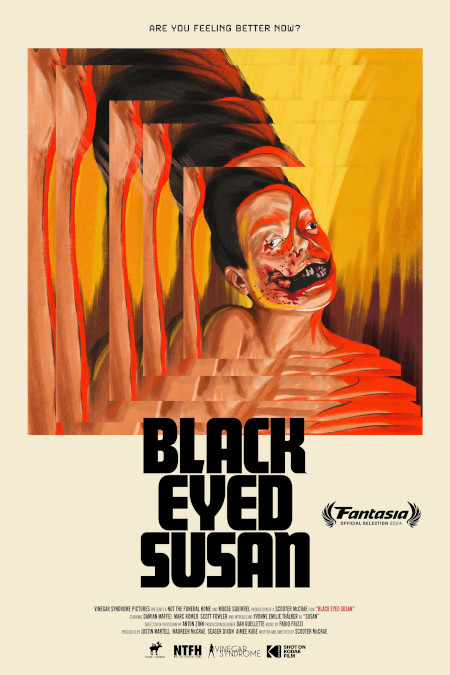Eye For Film >> Movies >> Black Eyed Susan (2024) Film Review
Black Eyed Susan
Reviewed by: Jennie Kermode

There’s a scene towards the end of Black Eyed Susan when the titular AI sex doll (played by Yvonne Emilie Thälker) is travelling in a car. The driver, Derek (Damian Maffei), turns on some music, and it emerges that she’s unfamiliar with the concept. Writer/director Scooter McCrae seems to be setting us up for one of those inspiring bonding moments when a robot breaks through a cognitive ceiling and suddenly learns to appreciate this truly human experience, but any hope that Derek had of such a moment are dashed when she says flatly that she prefers the noise of the engine. The take-away would seem to be that she’s just a machine after all. it’s only later, thinking about it, that you might realise she has expressed a preference, and not merely performed to please the man she was with.
Susan is the latest in a new line of dolls with a very specific function. She’s marketed to men who enjoy domestic abuse. Not simply domination or sadism of the sort that might be explored with a consenting human partner, but uncontrolled, violent aggression which could easily have fatal consequences, relished all the more because of the distress it causes. Susan is harder to break than a flesh and blood human being, but she can bruise, hence the nickname that the lab boys have for her. But in order to respond in a way that will leave customers satisfied, Susan’s AI needs experience. This is why – following the death of an old friend who was doing it before him – Derek is recruited to take on the task of teaching her.
It’s not an easy process. He doesn’t think of himself as a violent man. Sleazy tech boss Gil (Marc Romeo) eases him into it by talking at first about spanking, which seems much less serious. He’s introduced to Susan when she’s lying on a counter, simulating sleep, with various design notes scribbled on her skin. Later, when they meet in the test room, she’s sitting on a leather couch, expressing polite enthusiasm about their professional relationship. Just to make him more self-conscious, Gil’s colleague Amanda monitors the session using Susan’s senses. But what he initially struggles to do, at least when he thinks he might be judged for it, becomes easier with permission, and with practice.
Is Derek simply acting out the violence to begin with, to please the boss? Or is the acting what he has been doing beforehand, living his life under the guise of, as he describes his predecessor, ‘a good guy’? Gil encourages Alan to think if himself that way. He argues that when men have dolls to hit, they won’t be hitting real women – but is this too simplistic? What might be the end result or normalising the idea of such violence, rather than, say, teaching violent people how to manage their emotions better and avoid getting into such a state of rage? Over the course of the film, Derek will realise that there are behaviors he finds repellent, lines he never wants to cross – but then why is he able to adapt, with relative ease, to slamming his fist into Susan’s face?
One of the things that we know is associated with difficulty controlling emotion is a lack of social connection, of the moderating influence of other people. Has Gil deliberately sought out men like this – men who, without ceasing to bear responsibility, are, in their own way, vulnerable? Derek is homeless, living in his car. He doesn’t seem to have any real friends. He talks on the phone to the wife from whom he has recently separated, but we never hear her voice, and there’s an implication that he isn’t really listening to it. Increasingly, his world revolves around Susan, and with emotional dependency comes a tendency to project emotion onto her – something she’s designed to play along with. We never see her without him. McCrae keeps us uncertain how much we’re really seeing her, and how much is Derek’s perception of her.
Thälker’s performance is extraordinary. Not just that uncanny valley physicality, the too-still-ness of this being which at one instant seems human, then like something totally alien and cold. There is also a subtle yet dizzying shifting between modes: Susan’s provocative personality, Susan’s caring personality, and so on. The doll seems at her most alive when she’s asking questions that no human would. Maffei, for his part, invests Derek with a raw, unexamined emotional quality that makes him the perfect foil. During a stretch of the film in which we get a break from the violence, it’s easy to interpret the film as a sort of romance, to wonder if these two unlikely companions might somehow save each other. But is there really a Susan to be saved? Can she become more real, or is it more likely that Derek will become – or recognise himself as – more machine?
Underlying the human and not-quite-human drama here are sharp observations about the way capitalism feeds and in the process exaggerates human desires, about various ways in which workers are exploited, and about the challenges, for any individual, of trying to self-define outside of that system. There is also, naturally, a good deal said about toxic masculinity and its relationship therewith. The doll technology itself is well on its way to fruition in the real world, and like all good social science fiction, Black Eyed Susan invites us to have difficult conversations now, to decide ahead of time how we might deal with that.
We probably won’t. Difficult conversations are, by their nature, never popular, and the taboo nature of conversations around sexual violence provides a convenient excuse for those disinclined to participate. Some, of course, will genuinely find it too distressing to engage with, and that’s completely understandable. The film team themselves have been keen to warn people about some of the content, including the demeaning language used, though it’s hard to see how the subject might have been approached otherwise. Overall, it’s a remarkable temperate piece of work, and those people who go to see it for the wrong reasons are likely to leave disappointed, ill-prepared as they always are for being confronted with art.
In contrast to the clumsiness of uncontrolled human emotion, Black Eyed Susan is a thoughtfully developed, finely crafted thing. Its conclusion seems a little too easy, not reaching as far as it might, but is consistent with how we have come to understand the characters – and its aim, in the end, seems to be to serve as an opening gambit rather than trying to take on everything that there is to be said about the issue. One hopes that others will be able to engage as effectively.
Black Eyed Susan screened as part of the 2024 Fantasia International Film Festival.
Reviewed on: 05 Aug 2024















